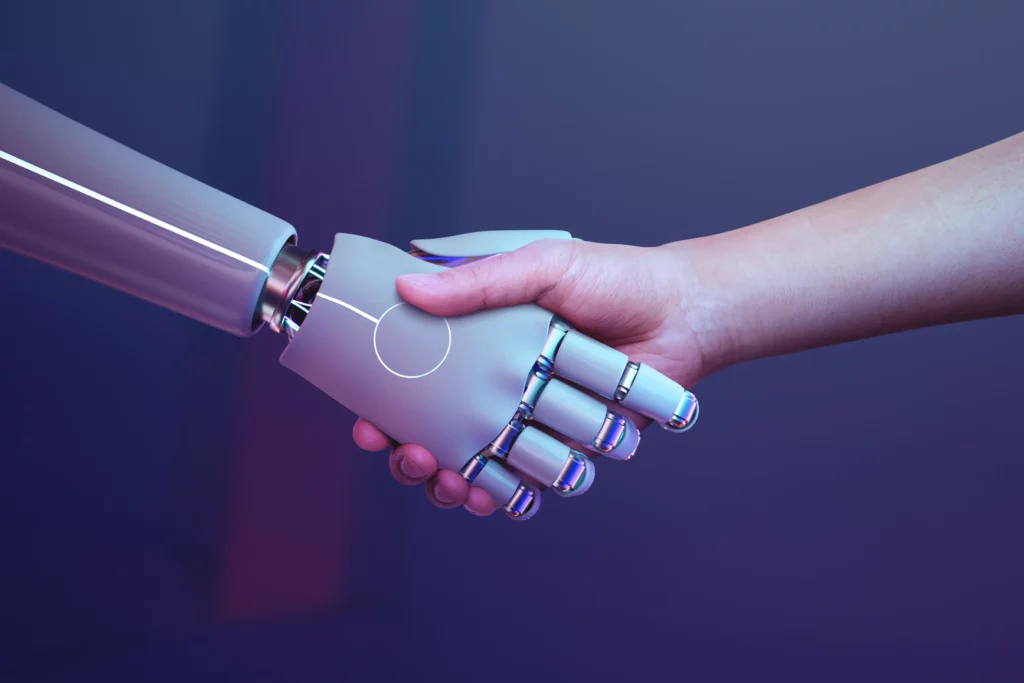Artificial intelligence (AI) isn’t just a futuristic concept found in sci-fi movies or tech conferences. In fact, artificial intelligence in everyday life is already deeply embedded in our routines. It works behind the scenes in ways that many people don’t even notice, quietly making tasks easier, faster, and far more personalized.
Whether you’re unlocking your smartphone, browsing your favorite online store, or navigating through city traffic, AI is the engine powering much of this seamless experience.
Have you ever wondered how your smartphone predicts the next word before you even type it? Or how a streaming platform seems almost psychic in recommending the perfect movie for your Friday night? These moments are not magic—they are examples of sophisticated AI systems analyzing patterns, learning from your behavior, and making decisions designed to improve your daily life.
In this expanded article, we’ll explore 10 practical and impactful examples of AI that you likely interact with every single day—often without even realizing it.
1. Smart Virtual Assistants
Virtual assistants such as Siri, Google Assistant, and Alexa are among the most recognizable examples of AI in daily life. These tools use advanced Natural Language Processing (NLP) to interpret your voice commands, respond to questions, and even carry out actions like sending messages or controlling smart home devices. Over time, they learn from your behavior—your frequent reminders, your music preferences, and even your routines.
For example, if you regularly ask about the weather at 8 AM, your assistant might start giving you morning updates proactively. This combination of learning and adaptation is what makes virtual assistants powerful and convenient companions.
2. Personalized Recommendations
Whether you’re using Netflix, Spotify, Amazon, or YouTube, you’ve experienced AI-driven personalization. These platforms use AI algorithms to analyze your behavior—what you watch, search, skip, purchase, or save. Based on this data, they deliver recommendations that feel tailor-made just for you.
This level of personalization is one of the biggest reasons users stay engaged with digital platforms. It eliminates guesswork and helps you discover new music, shows, or products that align with your tastes. In e-commerce, these recommendations often influence buying decisions, increasing both convenience for the user and sales for the retailer.
3. Spam Filtering and Email Security
Email providers use AI to protect users from threats such as spam, phishing, and malware. Machine learning models analyze email content, sender information, and even behavioral patterns to determine whether a message is legitimate.
If you’ve noticed that your inbox has become cleaner over the years, that’s because AI has improved dramatically. These systems can detect suspicious messages almost instantly and divert them into junk folders, reducing the risk of scams and improving your overall email experience. This is one of the most important safety applications of artificial intelligence in everyday life.
4. Smart Navigation and Maps
Apps like Google Maps, Apple Maps, and Waze rely heavily on AI to provide accurate navigation and real-time updates. These systems analyze huge amounts of data—from road conditions and traffic flow to accidents, weather, and user reports.
As a result, they can calculate optimal routes, estimate travel times, suggest faster alternatives, and even predict traffic before it happens. Behind the scenes, predictive AI models crunch enormous datasets to make sure your commute is as efficient as possible. Without AI, modern navigation apps simply wouldn’t exist.
5. Facial Recognition
Unlocking your phone with your face or automatically organizing photos by people is made possible through AI-based facial recognition technology. These systems identify patterns, analyze facial features, and match them to stored data.
Beyond personal devices, facial recognition is used in banking apps, contactless payments, airport security, and smart home systems. While the technology raises important discussions about privacy and security, it undeniably enhances convenience and speed in everyday tasks.
6. Voice Transcription and Subtitles
AI-powered transcription tools convert spoken words into written text—and they’re more accurate than ever. You’ve likely seen this in online meetings, YouTube auto-captions, or video editing software.
AI speech-to-text systems rely on machine learning models that understand tone, context, and accents. This makes content more inclusive and accessible, especially for people who are deaf or hard of hearing. It also saves time for professionals who need to transcribe interviews, meetings, or lectures quickly and efficiently.
7. Online Shopping Chatbots
E-commerce platforms now use AI chatbots to assist customers 24/7. These bots can answer questions, recommend products, track orders, and even help solve basic issues—without requiring a human agent.
AI also improves product search engines, making it easier for users to find exactly what they’re looking for. Some online stores use dynamic pricing models driven by AI, adjusting prices in real time based on inventory, demand, seasonality, and user behavior.
By offering instant assistance and smoother navigation, AI makes online shopping faster, smarter, and more convenient.
8. Medical Diagnosis and Health
In healthcare, AI has become a life-saving tool. Machine learning models analyze medical images—from X-rays to MRIs—detecting diseases like cancer, pneumonia, and heart conditions with remarkable accuracy. Some AI tools can spot abnormalities earlier than human eyes, leading to faster treatment and improved outcomes.
AI also helps create personalized treatment plans, track patient progress, and speed up drug development. Wearable devices powered by AI can monitor heart rate, sleep patterns, activity levels, and even detect irregularities in real time.
This integration of artificial intelligence in everyday life is changing how people understand and manage their health.
9. Gaming and Entertainment
AI plays a huge role in modern gaming. It powers computer-controlled opponents that adapt to your gameplay style, making games more immersive and challenging. Procedural generation—used in games like Minecraft or No Man’s Sky—creates dynamic worlds using AI algorithms.
Streaming platforms also use AI to improve audio quality, reduce buffering, and optimize visuals based on your device and internet speed. Whether you’re playing or watching, AI works in the background to enhance the full entertainment experience.
10. Home Security
AI-powered home security systems can distinguish between humans, pets, and objects. Smart cameras can detect unusual movement, notify you instantly, or even recognize familiar faces.
Video doorbells equipped with AI can tell you when a package arrives or when someone is at your door. Meanwhile, smart home systems learn your habits—such as when you turn the lights on or adjust the thermostat—so they can automate tasks and increase efficiency.
This gives homeowners greater peace of mind and allows for safer, more connected living environments.
The Future Is Already Here
Artificial intelligence in everyday life is not just a trend—it’s already a fundamental part of how our world operates. From the moment you wake up and check your phone to the final show you watch before bed, AI is assisting, guiding, and shaping your experience.
And this is only the beginning. As AI technology evolves, we can expect even more personalized, predictive, and intuitive tools. These innovations will continue to transform the way we work, communicate, shop, learn, and live.
Isabela is an Administration technician and part of Cenário Capital's administrative and financial team. She works behind the scenes, ensuring that every detail contributes to the company's sustainable growth. In addition, she collaborates with the SEO team, combining her analytical vision with content production to deliver relevant and organized information to those seeking to make financial decisions with greater clarity.







